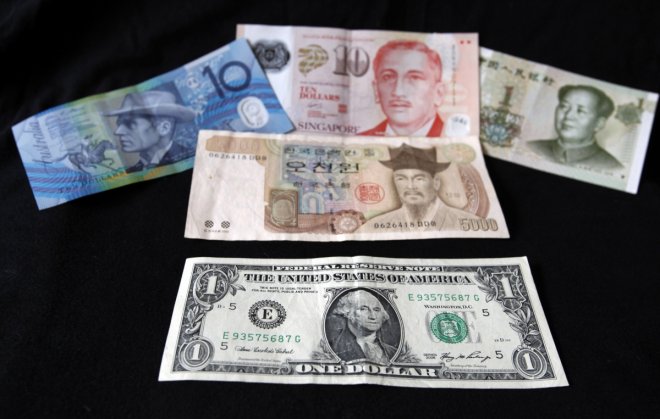
Asian currencies were down on Wednesday (Feb 1) against the US dollar which stabilised immediately after a sharp slide amid mixed stock market and economic data cues from the region.
The USD index, a gauge that measures the strength of the greenback against six major currencies in trade terms, had fallen to as low as 99.43 from 100.43 on Tuesday after Trump said China and Japan are manipulating money markets for trade benefits.
The index, however, managed to 99.74 on Wednesday, helped by value buying as well as fresh US comments about the Chinese yuan appreciation against the dollar.
Data from China showed that manufacturing activities continued to expand but at slowing pace. The official NBS Manufacturing PMI fell to 51.3 in January from 51.4 in December while markets expected 51.2.
It was the sixth straight month of growth but the lowest reading since October, as output and new orders eased while new export orders rose for the third straight month, the Markit release showed.
The Singapore dollar weakened to 1.4140/US dollar from 1.4092, pulling back off the near three-month high of 1.4069 touched on Wednesday.
In the bigger picture, the Singdollar had rallied 3.9% in January, ending a 5-month streak of losses and making a rebound from the 7-year low of 1.4546 touched earlier in the month.
USD/THB dropped from Tuesday's close of 35.12 to 35.08, matching the last session's intra-day low, which was its lowest since Nov 10. The pair then rebounded to 35.15 as of 1:40 pm Singapore time, reflecting the broad greenback strength.
Data from Thailand showed that inflation rose to a 28-month high of 1.55% year-on-year in January, helping the baht hold near the 80-day high it fetched in the last session.
USD/KRW rallied to 1157 from the previous close of 1150, translating to a 0.6 drop in the won on the day, and pushing it back from the 12-week high it traded in the previous session.
The Nikkei manufacturing PMI in South Korea fell to 49.0 in January from 49.4 in December, marking its sixth straight week of decline, data showed on Wednesday. However, the newly-launched business sentiment index rose the most in seven months.
The Malaysian ringgit was little changed near 4.4288 on Wednesday, where it has largely holding since 26 Jan. The ringgit too had gained in January with a 1.28% rally to 4.4300 from 4.4870.
The Indonesian rupiah traded near 13358, little changed from the previous close of 13350 while the Indian rupee has pulled off previous day's 6-week high of 67.5050 to 67.7090, with the Finance Minister Arun Jaitely scheduled to table 2017-18 Budget later on the day.
The Economic Survey that came on Tuesday has projected a GDP growth of 6.75-7.5% for 2017-18.
Stock Indices
The STI share index for Singapore was up 0.26% at 2:35pm Singapore time while Korea's KS11 up 0.64% and Taiwan's TWII up 0.25%. The Nikkei 225 was trading 0.56% higher Indonesia's JKSE up 0.59%.
However, Hong Kong's Hang Seng index which opened after holidays dropped 0.68% and Malaysia's KLSE Composite was down 0.88%. India's Sensex was up 0.1% but was choppy with a bias to green side.








